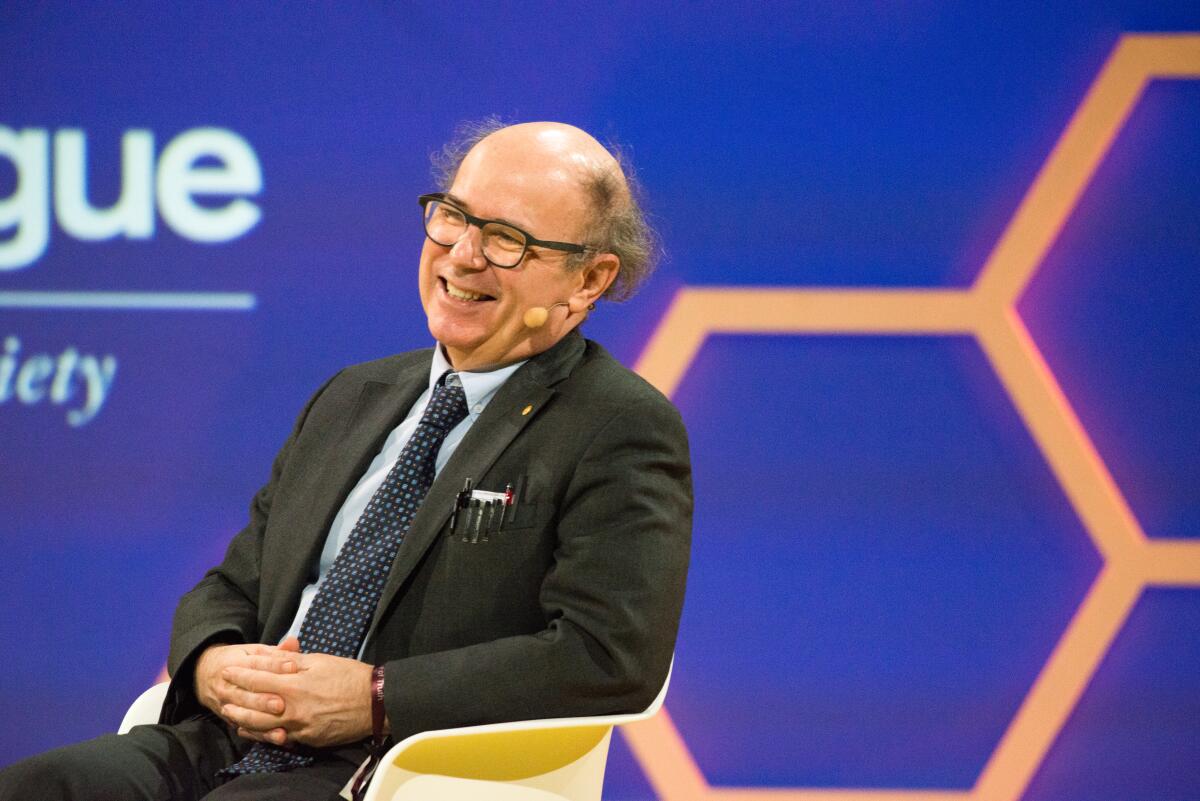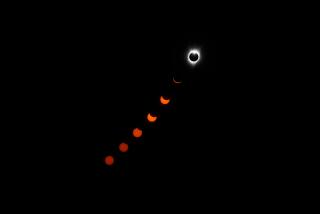Q&A: Talking God, science and religion with theoretical physicist Frank Wilczek

Frank Wilczek has a special fondness for rainbows.
It’s not just the show-stopping, full-arc-across-the-sky rainbows that catch the Nobel laureate’s eye. He’s equally transfixed by the array of color that shows up on soap bubbles, in sprays of water and in prisms.
For the record:
4:48 p.m. May 19, 2022An earlier version of this article said Uppsala University is in Stockholm. It is in Uppsala, Sweden.
“There are rainbows all over the place, once you start paying attention,” he said recently from his home in Concord, Mass.
In Judaism, rainbows serve as a reminder of the covenant God made with Noah to never again destroy the Earth. There is even a special prayer to recite when one encounters them. For Wilczek, 71, rainbows are both aesthetically “pretty” and serve as an invitation to launch into a scientific reverie about what makes the phenomenon possible: how the light is refracted, what the atoms are doing, how Sir Isaac Newton discovered the nature of color.
“My everyday life has been very much enhanced by occasionally reflecting on what’s going on under the hood,” he said.
As a theoretical physicist, Wilczek has been peeking under the hood of our perceived reality for more than 50 years. His insights and ideas have led to several revolutionary scientific discoveries, as well as an almost theological perspective on the nature of the world and our role in it that he shares in his myriad articles, books and talks for a general audience.
“In studying how the world works, we are studying how God works, and thereby learning what God is. In that spirit we can interpret the search for knowledge as a form of worship, and our discoveries as revelations,” he wrote in his most recent book, “Fundamentals: Ten Keys to Reality.”
It’s this articulation of the link between science and spirituality that led to Wilczek’s most recent high-profile award — the Templeton Prize — one of the world’s largest annual individual awards, valued at more than $1.3 million, which he received last week. The prize is given to those who use “the power of the sciences to explore the deepest questions of the universe and humankind’s place and purpose within it,” according to the Templeton Foundation.
Past recipients include Jane Goodall, the Dalai Lama, Desmond Tutu and St. Teresa of Kolkata.
Over the last 50 years, Wilczek’s ideas and insights have touched nearly every corner of physics. He won the Nobel Prize in 2004 for his theoretical description of the strong nuclear force, now a cornerstone of the Standard Model, which posits that everything in the universe is made of a few fundamental building blocks that interact with each other by no more than four fundamental forces — the strong force, the weak force, electromagnetic force and gravitational force.
In 1978 he predicted a new type of particle called an axion. Although yet to be detected, axions are among the leading explanations for dark matter, a mysterious substance that makes up most of the matter in the known universe, even though they are billions of times lighter than the electron.
More recently he introduced the idea of time crystals — a phase of matter that can sustain constant change without burning any energy — and anyons, particles that have a strange behavior when their positions are exchanged but can exist only in two-dimensional space.
“Really, in my opinion, these are all Nobel Prize-winning inventions,” said his friend and colleague Antti Niemi, professor of theoretical physics at Uppsala University in Sweden. “He is one of the few, I would say, that could easily get a second Nobel Prize.”
In addition to groundbreaking discoveries, Wilczek’s work has also led him to some of the same conclusions shared by mystics from all religions: the myth of separateness and the fundamental interconnectedness of all things.
As he wrote in “Fundamentals,” “Detailed study of matter reveals that our body and our brain — the physical platform of our ‘self’ — is, against all intuition, built from the same stuff as ‘not-self,’ and appears to be continuous with it.”
Other spiritual insights from his decades of scientific study include the idea of complementarity — that different ways of viewing the same thing can be informative, and valid, yet difficult or impossible to maintain at the same time, and that science teaches us both humility and self-respect.
“Within ourselves we have enormous resources,” he told an online audience last year. “We are small compared to the universe, but we are large compared to what it takes to have dynamic patterns and process them in time. Walt Whitman was right when he said he contains multitudes.”
Wilczek’s friends and students describe him as a kind and generous scientist who never lost his childlike wonder at the immense beauty of the world and how it all works.
“There’s a distinction between curiosity and wonder,” said Jordan Cotler, who studies theoretical physics at Harvard and who started working with Wilczek as a college undergraduate. “Curiosity is an intellectual outlook, but wonder suggests there is something in your soul that compels you to know more about the world. That’s something he embodies in a real, genuine way.”
Here Wilczek tells us more about his thoughts on religion, God, and how science has informed his perspective on life.
This interview has been edited for length and clarity.
Do you consider yourself an atheist, agnostic? Do you have a definition you’re comfortable with?
Not affiliated with any specific recognized church is certainly part of it, but I’m more comfortable saying that I’m a pantheist. I believe that the whole world is sacred and we should take a reverential attitude toward it.
Are science and religion in conflict with each other?
No, they are not in conflict with each other. There have been problems when religions make claims about how the world works or how things got to be the way they are that science comes to make seem incredible. For me, it’s very hard to resist the methods of science which are based on the accumulation of evidence.
On the other hand, science itself leads to the deep principle of complementarity, which means to answer different kinds of questions you may need different kinds of approaches that may be mutually incomprehensible or even superficially contradictory.
You’ve written that “in studying how the world works, we are studying how God works, and thereby learning what God is.” So, what do you think God is?
Let me lead into that by talking about two of the greatest figures in physics and their very different views of what God is. Sir Isaac Newton was very much a believing Christian and probably devoted as much time to studying Scriptures and theology as he did to physics and mathematics.
Einstein, on the other hand, often talked about God — sometimes he used that word, sometimes he said “the old one” — but his concept was much different. When he was asked seriously what he meant by that, he said he believed in the God of Spinoza, who identified God with reality, with God’s work.
That was Einstein’s view and that is very much closer to my spirit. I would only add to that that I think God is not only the world as it is, but the world as it should be. So, to me, God is under construction. My concept of God is really based on what I learn about the nature of reality.
Does that God have a will?
Not a will as we would ascribe to human beings, although I’m not saying that’s logically impossible. I would say it’s really a stretch, given what we know. The form of the physical laws seems to be very tight and doesn’t allow for exceptions.
The existence of human beings, as they are, is a very remote consequence of the fundamental laws. One thing that [the physicist] Richard Feynman said really sticks in my mind here. He said, “The stage is too big for the players.” If you were designing a universe around humans and their concerns, you could be a lot more economical about it.
Can God be detected, or is that the wrong question?
I think that’s the wrong question. God can be constructed. And that’s what I hope we’re doing in a murky way. As I said, God to me is the God of Spinoza and Einstein, supplemented with the idea that we play a role in making him.
While I was preparing for our interview, I came across a statement by the Catholic Bishops of California that said science cannot answer our deepest and most perplexing questions like, “Why am I here?” “What is the purpose of my life?” “Why have I suffered this loss?” “Why is God allowing this terrible illness?” They said these are religious questions. Do you agree?
Science doesn’t answer those questions. On the other hand, you ignore science at your peril if you are interested in those questions. There’s a lot you can learn from science by expanding your imagination and realizing the background over which those questions are posed. So, saying that science doesn’t have a complete answer is a very different thing than saying, “Go away, scientists; we don’t want to hear from you, leave it to us.”
Knowing what you know about fundamental rules, and the properties of matter — do you think this world is an illusion?
I wouldn’t say reality is an illusion. We experience it, but our naive models of reality, the ones we come to as children, don’t do it justice.
One of my favorite quotes in your book is this: “The world is big, but you are not small.” How has this truth affected your life?
Sometimes when I’m discouraged or some unpleasant thing has happened, I call that to mind. The world is big, so on cosmic scales, my little woes don’t matter. But they matter to me, and I should do something about them. But I shouldn’t let them get me down too much because the stakes on a cosmic scale, overall, are small.
Have some humility but also self-respect. That’s what the universe tells us.







